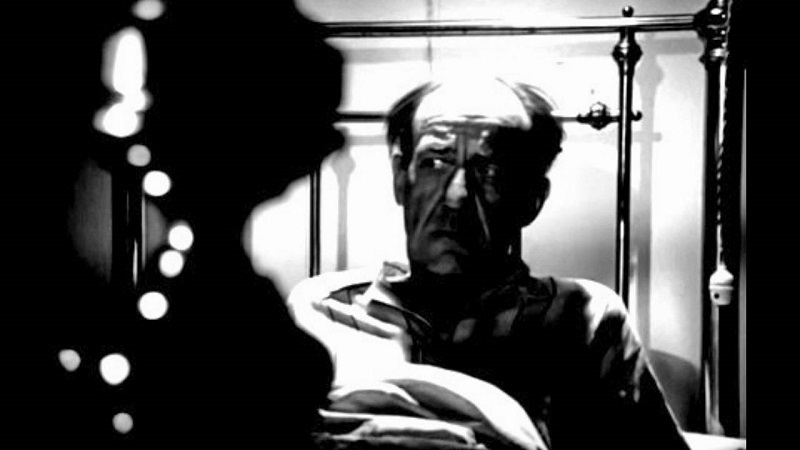Illuminating The Magic Lantern
The Austin film podcast conjures British ghosts for AFS
By Richard Whittaker, 7:00AM, Mon. Nov. 19, 2018

Before cinema, there was the magic lantern. That glorious, incandescent source of entertainment lives on in spirit through Austin's Magic Lantern podcast, where wonder – and tonight, terror – replace the sense of cynicism that so often pervades film culture.
Hosted and curated by Ericca Long and Cole Roulain, the biweekly show is on the verge of its 100th episode, having covered films as diverse as They Live and Hoosiers, In a Lonely Place and Sweet Charity. But tonight The Magic Lantern will light up the screen at Austin Public for a very special night of British ghost stories, drawn from the archives of the BBC (read more here about that), celebrating the work of the master of the Christmas scare, M. R. James.
Before the screening, we talked with Long and Roulain about what makes the Magic Lantern podcast special, and how two Austin podcasters came to champion some very English scares.
Austin Chronicle: So what's the history of the Magic Lantern podcast?
Magic Lantern Podcast: First and foremost, we're married, and we found each other in part through our shared love of film. The podcast grew out of our desire to want to do something creatively together, and to express that very deep love of film, to share the things that get us excited with an audience. We looked for quite a while to find the kind of show we would like to listen to without much success.
Geek culture is well-covered and snark is something we have no interest in, so we just finally decided to make the show that we wanted to hear instead. Our editorial approach is basically this: We have a finite amount of time on this planet and would rather spend it telling you about stuff we genuinely and enthusiastically love instead of being ironic or detached.
Now, more than three years in and approaching our 100th episode, the best part of talking about the films we love and the things we love about them is hearing from people who checked out something we talked about and now they love it too.
AC: Being British, I grew up with both the tradition of ghost stories at Christmas, and the BBC's A Ghost Story for Christmas series, but when did you first learn about both the tradition and these dark classics?MLP: We both grew up as PBS kids, so we're pretty big Anglophiles, coming of age during that golden period between Monty Python's Flying Circus and PBS's various mystery series (Miss Marple and Poirot, Sherlock Holmes). Cole came to this specific series first several years ago because of a combination of those influences and being a big fan of the horror genre, in general.
We found so many things that we love that way – these ghost stories, the series Supernatural, the Play for Today presentation of Robin Redbreast, The Stone Tape, even those great, creepy public information films like "Apaches" and "Lonely Water"!
As far as the tradition goes, that goes back to childhood for Cole and having an LP that had a reading of Dickens' The Signal-Man on it. Never going to forget that record, wore the grooves out on it. Ericca also has distinct memories of reading A Christmas Carol in school and feeling like it was a revelation in terms of phrases Dickens coined and how different it felt from the movie adaptations she had seen. We both had read and loved M. R. James, so Ericca said it felt like all her dreams had come true when Cole first showed her Ghost Stories for Christmas. She's also a lover of Christmas, and is drawn to the dark side of the holiday, so to have something traditional, yet not, to enjoy during that time of year is great.
AC: There's little doubt that James is the master of the Christmas ghost story – even if Christmas rarely if ever features in the stories, and many are explicitly set in other seasons. For you, what do you think is the appeal of his work, and why do they lend themselves so well to adaptation?
MLB: James is both an odd and a perfect choice for adaptation. In his stories, he often creates narratives that include all sorts of pointed, humorous references to the life of the early 20th century academic that clearly reflected his own, and of which we have no direct experience, and yet can completely relate to. He's writing about an insular world that doesn't seem like it might have a universal appeal, and yet does. Maybe it's because his style is so accessible, even when at its most acerbic? We tend to give his protagonists a lot of leeway due to their naivete and guilelessness and they're often appealing because they're seekers in some way – traveling, studying. It's an admirable quality. He weaves the past and the present, and maybe that is something that is on our minds during the holiday season and the darkness of winter. The handful of misanthropes that turn up in his stories are often getting a harsh comeuppance, so maybe we're just trained by A Christmas Carol to want to see those parallels.
AC How did you pick the two M. R. James titles – the 1968 adaptation of "Oh Whistle, and I'll Come to You, My Lad" directed by Jonathan Price, and the 1973 "Lost Hearts" by Lawrence Gordon Clark – as the two examples you would show at Austin Public?MLP: "Whistle" we chose because it is the prototype, the Rosetta stone. We love to trace the evolution of a thing and without it, we likely wouldn't have the rest. Plus, it's nice to have to compare and contrast with the style that would develop as Lawrence Gordon Clark took the reins.
We picked "Lost Hearts" because the adaptation works so well to expand the world James started in the story. It brings to life the character of the uncle, and gives "life" to the terrifying child ghosts. We also picked it because of how audaciously the subject matter is treated, especially as it involves children. The academic is definitely in the story after a fashion, but it's the children at the center. These two titles seemed to work well together, plus they are truly ghost stories, not just supernatural or weird fiction.
AC: Of the two directors, Jonathan Price is arguably the better known (not only for his directing work, but as an all-round polymath). But Lawrence Gordon Clark really defined those stories, and did much to establish the look of period supernatural horror at that time (so much so that ITV and then Channel 4 hired him away from the BBC to do their own ghost stories). What do you think he brought to these stories?
MLP: In "Lost Hearts", for example, Clark and the production team (we're giving credit to Don Taylor, production designer, as well) created that world of the recluse predator who is seeking to bring the dark arts to life and has, in his study especially, every gadget for the purpose. It's a tabernacle of transmogrification! It's that level of care and detail that make all the difference. They're shot on 16mm too, so they have that distinct look.
The most important thing, though, is that he understood he was working on a smaller scale. This wasn't cinema, this wasn't VistaVision. It was television, and it seems like he innately understood that it's a more intimate experience and requires a different touch, a different sensibility. In addition to that, he also maintains and expands on what was already stellar pacing and suspense in the stories, and keeps all the humor intact. It makes for a very affecting and entertaining package.
History of Television: BBC Ghost Stories is presented by the Magic Lantern podcast, Mon., Nov. 19, 7pm. Austin Public Studio, 1143 Northwestern. Tickets and info at www.austinfilm.org.
Download episodes of the Magic Lantern podcast at www.magiclanternpodcast.com.
A note to readers: Bold and uncensored, The Austin Chronicle has been Austin’s independent news source for over 40 years, expressing the community’s political and environmental concerns and supporting its active cultural scene. Now more than ever, we need your support to continue supplying Austin with independent, free press. If real news is important to you, please consider making a donation of $5, $10 or whatever you can afford, to help keep our journalism on stands.
May 23, 2025
Podcasts, The Magic Lantern Podcast, History of Television, Austin Film Society, Austin Public, M. R. James









